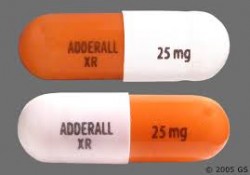
Adderall is a central nervous system (CNS) stimulant medication containing amphetamine and dextroamphetamine most commonly prescribed to treat attention deficit hyperactivity disorder (ADHD. A dramatic rise in the number of Adderall prescriptions prescribed annually suggests that many of these medications are being diverted to others who would become addicted through Adderall abuse for its ability to produce euphoria, wakefulness, and energy. What many Adderall abusers fail to recognize is that the positive effects of Adderall abuse are short lived as the brain and body becomes adapted to the drug.
When choosing the best Adderall addiction treatment, focus on the issues that are most suitable to your recovery goals and needs. According to the Institute of Medicine (US), “Regardless of the nature of their conditions, what all people with M/SU problems and illnesses have in common is the hope that when they seek help for their condition, they will receive care that enables them either to eliminate it or to manage it successfully so that they can live happy, productive, and satisfying lives—care that enables them to recover.”
Developing an Adderall Addiction
While Adderall helps to make up for the shortfalls in neurotransmitter activities for those suffering from ADHD, tolerance and dependency in others is a high risk that leads to abnormal and more frequent dosage needs to avoid experiencing the negative effects of withdrawal. It’s this latter stage of addiction that makes ceasing the abuse of Adderall difficult and normal moods, attitudes, and behaviors begin to spiral out of control.
Whether Adderall abuse has taken a prominent place in your life or you are an occasional abuser experiencing the “binge” and “crash” cycles of Adderall abuse, Adderall addiction treatment can help you to regain positive control in your life. You may not be immediately motivated to engage in a treatment program or even understand how recovery can be possible, but, motivation is a key product of changes in habits that make life seem more worthwhile.
Signs of Adderall Addiction

Signs of Adderall addiction include denial and manipulation.
Environmental influences and condition cues are relapse triggers that an Adderall addict will face no matter how hard they try to remain abstinent. Combined with physiological disruptions that cause internal stress and vulnerability to relapse, it will not be easy without adequate treatment and support. Some signs you need Adderall addiction treatment may include:
- Cravings and preoccupations with Adderall abuse
- Compulsions to use despite the negative consequences yourself or others
- Repeated and unsuccessful attempts to detox or relapse after a period of abstinence
- Excessive amounts of time and resources spent seeking and using the drug
- Using denial, rationalizations, manipulations, or blame to defend your ongoing abuse
- Changing associations to have access and approval for Adderall abuse
- Isolation or social withdrawal from family, friends, or from activities you once enjoyed
- Psychological disturbances such as emotional instability, depression, insomnia, and violent or suicidal tendencies
How Does Adderall Addiction Treatment Help?
Adderall addiction treatment involves a safe and compassionate detox that helps you to eliminate the drugs from your body while minimizing physical and/or psychological distress and discomfort. Cravings, depression, psychosis, agitation, insomnia, confusion, violent or suicidal behaviors, and physical discomforts are common traits of Adderall withdrawal that often lead resuming use before a person ever gets to benefit from the counseling and behavioral therapies that Adderall treatment programs provide.
The SAMHSA defines recovery from mental and/or substance use disorders as a process of change through which individuals improve their health and wellness, live a self-directed life, and strive to reach their full potential. Counseling and behavioral therapies are the primary components of a rehabilitation phase where you learn to identify problematic areas in your life and develop skills to avoid triggers that would lead to relapse.
Medical, psychiatric, and psychosocial services or referrals can influence your confidence and ability to succeed by reducing other negative aspects in your life for which ongoing co-existence would bring you down and limit your recovery success. Other components may include:
- Case care and management
- Recovery support services
- 12-Step fellowship and peer supports
Do You Need Outpatient or Inpatient Adderall Addiction Treatment?
Advancements in research, increased access, and improvements in both inpatient and outpatient programs offers a wide range of choices in effective Adderall addiction treatment that can be tailored to your needs. According to the NIDA” Matching treatment settings, interventions, and services to an individual’s particular problems and needs is critical to his or her ultimate success in returning to productive functioning in the family, workplace, and society.”
For the most part, an outpatient program may be suitable to a person who has ongoing involvement in their families and society that would be unreasonably interrupted by participating in an inpatient program. Outpatient treatment allows the person to remain engaged in normal activities, but, also adds to their vulnerability risks every time they leave the facility.
An inpatient program typically lasts longer, is more intensified, and generally has a profound one-on-one influence of counselors and staff that may be feasible for a heavy Adderall abuser or someone with limited outside support. Those with a history or prior treatments or compromised health issues can also benefit from an inpatient Adderall addiction treatment. Time is of the essence and time in treatment really does matter, so you will want to be sure that the program provides the most comprehensive care for the complexity of your situation and one that encourages treatment retention by providing the most resources to combat the addiction once you are back on your own.


